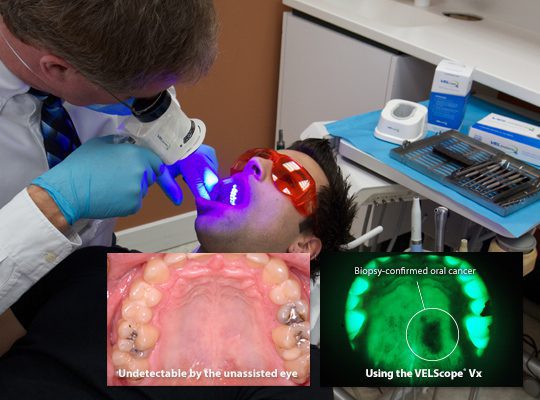Preventable, If Detected Early
Life can get busy, and you may not have noticed that April was Oral Cancer Awareness month. We understand. Too often we don’t make the connection between a bright happy smile and oral cancer prevention. Having Oral Cancer Awareness month helps us to communicate how important oral health care is in protecting you from an otherwise preventable form of cancer. Now, as we head into May, let’s start doing something about it. Book your appointment today with Dr. Baird to help detect this often fatal condition early.
It’s early detection, after all, that helps save people’s lives. At Georgia Dental we care about your health and believe dental care is all about prevention and the oral cancer examination is truly the foundation of good oral health. Accompanied with a routine dental visit, it is fast, easy, and painless – and it could save YOUR life.

We’re not going to show you any images of oral cancer. Just trust us — you don’t want it.
A little bit about Oral Cancer
The Canadian Cancer Society states that three people die from oral cancer every day in Canada. In fact, Oral cancer has a lower five year survival rate, than the survival rates of breast, cervical and prostate cancer. But, given that the potential for death is significantly reduced if cancer is detected early, making treatment easier, it can be less invasive and more than 90% curable. The Cancer Society estimates that by end of 2015:
- 4,300 Canadians will be diagnosed with oral cavity cancer.
- 1,150 Canadians will die from oral cavity cancer.
- 2,900 men will be diagnosed with oral cavity cancer and 800 will die from it.
- 1,400 women will be diagnosed with oral cavity cancer and 380 will die from it.
Some contributing risk factors of oral cancer are age and excessive alcohol and tobacco use, and more recent studies also indicate that infection of the oral cavity can come from the Human Papilloma Virus (HPV). Oral cancer refers to to all cancers of your mouth, which includes the following:
- lips
- tongue
- teeth
- gums (gingiva)
- inside lips and cheeks (labial and buccal mucosa)
- lower bottom of the mouth
- roof of the mouth (palate)
- the area at the back of your gums, behind the wisdom teeth
Most oral cancers are located on the sides of the tongue, floor of the mouth, and lips. It can start in the cells of the mouth despite these cells normally being quite resistant to damage. But repeated injury from the leading risk factors like smoking, alcohol, HPV from oral sex, or even abrasive friction may cause sores and painful areas where cancer can start.
As widespread as oral cancer is, it still does remain very preventable. The Canadian Cancer Society recommends that Canadians of all ages be checked for oral cancer on an annual basis in order to keep their smiles more than healthy and bright, but also cancer-free. Good oral health is a team effort and we need you to participate with us in your dental health care to ensure you maintain a healthy mouth. It starts with a personal commitment to brush and floss your teeth daily, and to come see us on a regular basis. Help us help you!
Oral Cancer Checks
Oral cancer checks are a simple, painless process that only takes a few minutes. These checks can usually happen along with a routine visual and physical oral examination. Dr Baird will examine your mouth using a safe fluorescent visualization scope. This helps identify any potential lesions that could be cancerous or unhealthy. This method produces a wavelength of light that’s shone into the mouth, where it activates tissue fluorophores (naturally-occurring fluorescent chemicals) that emit a blue fluorescent characteristic. When viewed through filters that detect non-fluorescent tissue, the tissue appears as a dark area and should be examined more thoroughly.

An actual example of oral cancer being detected using a VELscope device
A yearly oral cancer check is as essential to your peace of mind in preventing oral cancer as a yearly physical is an essential part of your health care. It’s important to be aware of the possible symptoms associated with this pervasive and often overlooked cancer risk:
- a sore on the lip or in the mouth that does not heal
- a lump on the lip or in the mouth or throat
- a white or red patch on the gums, tongue, or lining of the mouth
- unusual bleeding, pain, or numbness in the mouth
- a sore throat that does not heal, or a feeling that something is caught in the throat
- difficulty or pain with chewing or swallowing
- swelling of the jaw that causes dentures to fit poorly, or become uncomfortable
- a change in the voice and/or pain in the ear
We are here to help and want the best for you and your oral health. Let’s work together to maintain a healthy mouth and even more importantly, a bright and happy smile.
Come visit us soon!
